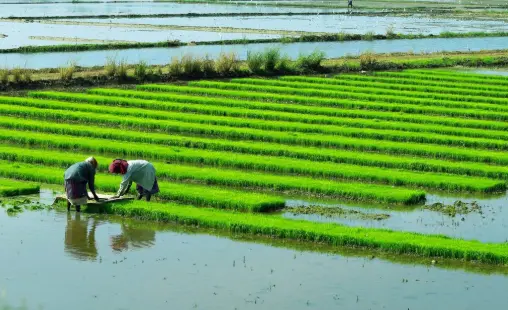Agricultural innovation rice production Nigeria
Nigeria is one of the largest rice consumers in the world, but it is still heavily dependent on imports from China, India, Indonesia, and America. With our rice production programme, we focus on the regions with the greatest yield potential and aim to close the gap between current and achievable tonnes-per-hectare yields.

What is the current problem in Nigeria?
The rice industry in Nigeria is facing various systemic issues that hinder self-sufficiency and fuel the import of over 2 million metric tonnes of rice per year. The sector is heavily reliant on smallholder farmers, who often encounter barriers such as limited access to quality seeds, high import costs, and inadequate irrigation infrastructure. Rice yields in Nigeria remain alarmingly low, at less than 2 tonnes per hectare, well below the comparable yield in Egypt; 8 tonnes/ha and the global average of around 4 tonnes/ha. The country continues to grapple with insecurity, a challenging macro environment, and climate change, which further restrict production.
Rice processing operations are heavily reliant on diesel generators due to the unreliable electricity supply from the grid. Rising diesel prices, which nearly doubled between 2023 and 2024, have significantly increased production costs. Small millers using diesel engines spend an average of $500 per month on energy, a fraction of what would have been sufficient through grid power.
Together with local farmers, research institutions, and government partners, we are introducing improved seed varieties, efficient irrigation methods, and basic mechanisation. This technical support goes hand in hand with training, access to micro-financing, and a strong focus on environmental protection.
Project approach: Focus on investments and rice cultivation. Mills are of utmost importance for food security in the region.
Why this project?
- Local food security – More domestic rice means less expensive imports and more stable prices.
- Income growth for farmers – Higher yields translate directly into better income and new jobs in the supply chain.
- Sustainable development – Water-saving irrigation and soil management protect the environment for future generations.
By linking data from the USDA PS&D database to practical innovation, Be Ubuntu creates a measurable impact: more rice on local land, less pressure on the national treasury, and a stronger, resilient rural economy. Join us and help accelerate Nigeria's path to rice self-sufficiency.